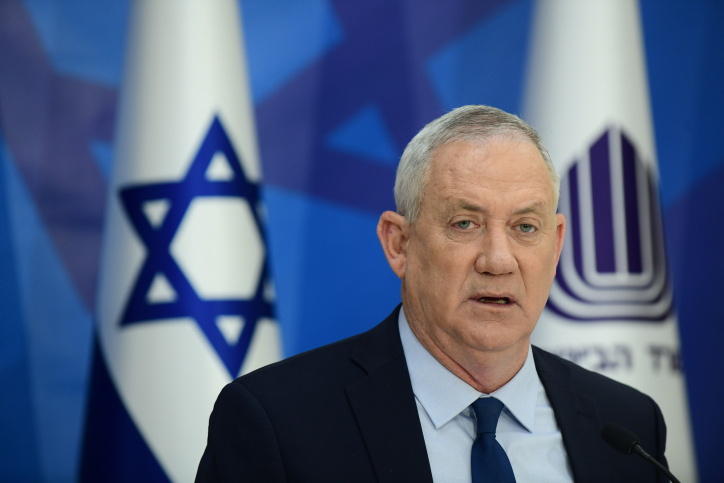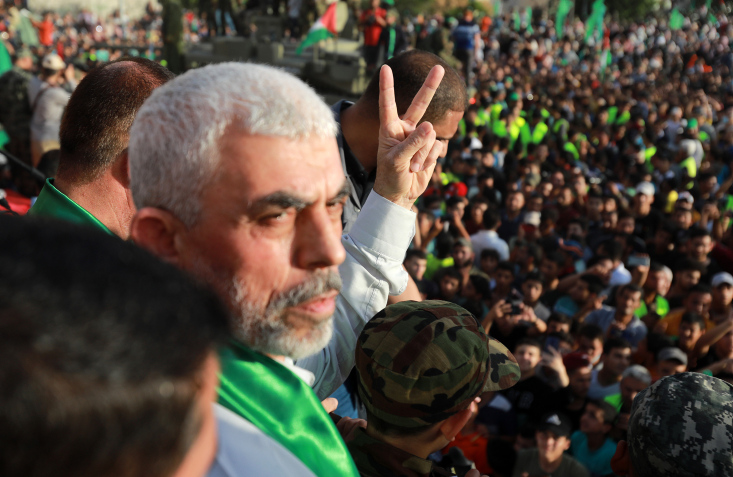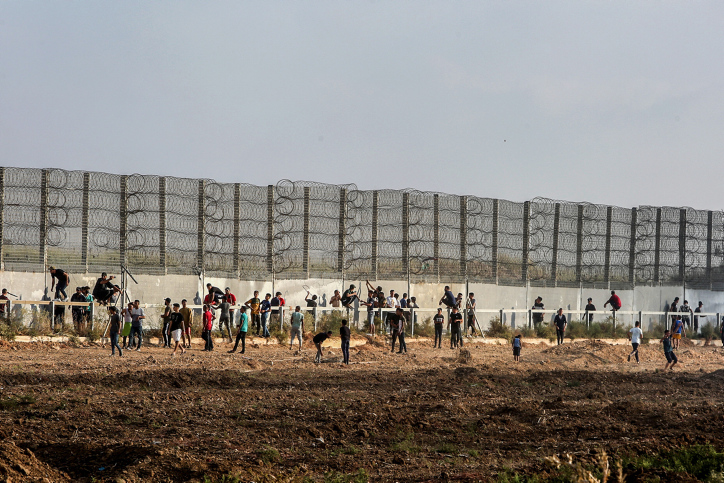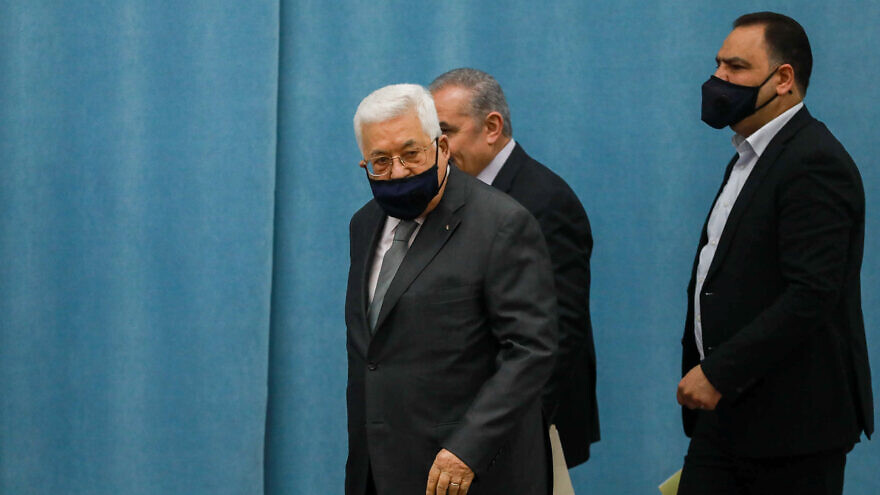Hamas has good reason to be concerned by the recent meeting between Israeli Defense Minister Benny Gantz and Palestinian Authority leader Mahmoud Abbas in Ramallah, a former senior Israeli defense official told JNS.
According to Maj. Gen. (res.) Eitan Dangot, Israel’s former Coordinator of Government Activities in the Territories (COGAT), and a senior research associate at the Miryam Institute, the meeting between Gantz and Abbas was overdue and sent important signals that Hamas will find troubling.
Israel is emphasizing, through the meeting, that it will hold highly contrasting policies towards these two territories, according to Dangot. Security tensions will dominate Israel’s approach to Gaza, ruled by a radical terrorist regime, while Israel will seek ways to improve a variety of issues in its management of policy towards the P.A.
The fact that a senior Israeli decision-maker met with Abbas for the first time in 10 years is highly significant, he stated, adding that the meeting should have occurred sooner.
“It is a mistake to make Gaza more important than Judea and Samaria,” said Dangot. “In my view, Judea and Samaria have much more importance for the internal security of Israel than Gaza. Gaza has clear boundaries, and Israel is facing a radical extremist movement that has the ideological goal of shedding the blood of its civilians and soldiers, and harming its existence. While there are criticisms of the P.A.’s conduct, its residents, more than 2.7 million Palestinians, are living in daily coexistence with more than 400,000 Israelis who live in Area C.”
Daily interaction on the roads, at checkpoints and even during shopping at stores means Israel has a clear interest in boosting its influence over the P.A., argued Dangot.
Meanwhile, the P.A. is facing its own especially sensitive period, with an unsettled Palestinian street, made more agitated by the power struggles of would-be successors to Abbas. Public demonstrations against the P.A. have rocked the Ramallah government, with members of the West Bank public also expressing disgust with corruption and the cost of living, according to Dangot’s assessment.

During their meeting, Gantz and Abbas discussed political, security, civilian and economic issues. Following the event, Israel moved to provide the P.A. with a 500 million shekel ($156 million) loan to help stabilize its troubled economic situation.
According to the Meir Amit Intelligence and Terrorism Information Center, the meeting received widespread coverage in Palestinian media, Fatah welcomed the event, while Hamas and Palestinian Islamic Jihad condemned Abbas and accused of him being a traitor.
“They agreed to continue communicating further on the issues that were raised during the meeting,” said a statement from Gantz’s office.
The meeting was also attended by the current head of COGAT, Maj. Gen. Ghassan Alyan, P.A. Minister Hussein al-Sheikh, and the head of the P.A.’s General Intelligence Service, Majed Faraj.

Dangot said such meetings “were routine when I was military secretary and head of COGAT,” adding that “not holding meetings caused a degree of damage. Personal dialogue can lead to changes.”
Preparing for a post-Abbas era
Traditionally, the P.A. has faced obstacles to its rule in the Hebron area, where there is a concentration of Hamas supporters, noted Dangot. The fact that the P.A. is facing cracks in the stability of its rule that began to emerge in earnest after Abbas canceled Palestinian elections in April means that the post-Abbas era has effectively begun, he warned.
“As a result, the P.A. is taking a certain risk in holding a meeting with senior Israeli figure, since many would-be successors of Abbas from Fatah are positioning themselves at this time, and are not interested in affiliating themselves with Israel. Abbas took a certain risk,” said Dangot.

“On the other hand, this gives the P.A. an advantage since Abbas projected stability to the Palestinian street. He sent the message that security and civilian coordination with Israel will continue in face of threats at home, led mainly by Hamas, which is seeking to incite and fracture his rule. Hence, this meeting delivers a message that a large part of the Palestinian public is looking for—continued economic stability,” the former officer stated.
Dangot stressed the importance of personal dialogue as a mechanism for better dealing with future crises.
“In the present, the goal of this meeting was to improve the P.A.’s economic capabilities, and as a by-product, to prevent parts of the Palestinian public from joining violent incidents,” said Dangot.
“Since 2008, large parts of the Palestinian public have demonstrated that economy comes before national issues for them. They understand the cost of losing and were not part of Middle East revolutions. Hence, Israel’s obligation is to exercise its ability to continue to advance the lives of Palestinian civilians, promote economic development, and helping economic initiatives,” said Dangot.
Israel needs to seriously prepare for the post-Abbas era, he said, by getting a better sense of the Palestinian public mood and a better understanding of who potential Abbas successors will be.
Addressing the P.A.’s problematic activities
Dangot said there is “no argument” over the fact that the P.A. is involved in multiple troubling activities, such as its push to place Israel on trial at the International Criminal Court, ongoing incitement, and the policy of paying stipends to security prisoners and the families of terrorists killed in their attack efforts.
“All criticisms of these things are fully justified,” he said. “But a country has to set its strategy based on an ongoing assessment and of the alternatives that are at its disposal. Due to the high importance of Judea and Samaria for Israeli security, Israel cannot stick its head in the sand and fail to lead on a policy that it set. It has to deal with these problems as part of a general dialogue with the other side.”
Dangot argued that while Abbas is not a fan of Israel and “not the ideal leader,” he is still “the one who is signed onto agreements that commit the P.A. It is his security forces who, almost daily, return Israeli civilians who got lost and found themselves in Area A safely to the IDF. There is a clear joint interest for the P.A. and Israel to prevent a radical movement like Hamas from entrenching itself in Judea and Samaria. This interest becomes the strongest.”

This has led Dangot to the conclusion that it is possible to continue to keep levels of violence low in the West Bank, while still “not ignoring the other problems” that stem from the P.A.’s conduct as described above. Israel must demand a decrease in the use of money by the P.A. for supporting families of terrorists and security prisoners, he said.
During Abbas’s era, he added, “there will be no political agreement. Abbas won’t end his role in the P.A. with a legacy of giving up on the ‘right of return’ in an agreement with Israel. But he won’t want to collapse his entire concept by losing control and seeing chaos take over in Judea and Samaria either,” he added.
Past experience has shown that Israel, backed by American pressure, has been able to cause Abbas to reign in his diplomatic and legal attacks on Israel, noted Dangot.
Israel must demand that the P.A. decrease its payments to families of terrorists and security prisoners, and halt its activities at the ICC, he added. “Together with the U.S., it is possible to stop these processes.”
Ultimately, Israel has to choose between available alternatives, he argued. “This is what pragmatism forces us to choose from.”
More trouble in Gaza
Dangot is decidedly less optimistic over what the future holds for the Gaza Strip.
Hamas has continued to escalate the border region with Israel through a series of violent disturbances. Border Policeman Barel Hadaria Shmueli, who was killed by a Hamas gunman at the border during a violent disturbance on Aug. 21, was laid to rest on Monday. Several Palestinian rioters were shot during the disturbances, some fatally.
On Aug. 28, Hamas restarted its harassment and attrition activities at nights along the border fence, sending activists to hurl explosive devices and launching arson balloons towards Israeli communities. Hamas is demanding that Israel loosen security restrictions around Gaza, and enable rebuilding projects to go ahead, even after an arrangement to facilitate the transfer of $10 million of Qatari cash per month has begun for needy Gazan families.
Israel has announced a series of measures to ease conditions in Gaza, including the entry of building material for the first time since May’s conflict. Egypt reopened Rafah Crossing after closing it for six days. On Wednesday, Israel expanded the Gazan fishing zone to 15 nautical miles and opened the Kerem Shalom Border Crossing for more equipment and commodities to pass through it. It also increased Gazan entry permits for traders, from 2,000 to 7,000. Yet none of this seems to be enough for Hamas, which continues to threaten further escalation.
“I sense a desire by the Israeli government to prevent an escalation for the coming months,” said Dangot. Should Israel give up on its conditions, stipulated after the May conflict, such as conditioning widespread rebuilding projects on Gaza on Hamas’s release of the remains of two IDF personnel killed in action in 2014 as well as two captive civilians, that will not lead to calm, Dangot warned.
Should Israel continue to insist on conditioning a breakthrough arrangement on Hamas meeting those conditions, he believes that too will lead to an escalation.
“In either case, both routes lead to one clear thing: an escalation with Hamas,” said Dangot. “This is inevitable. The question is the timing.”


























